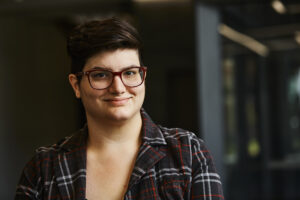New faculty Q&A: Discovering black holes in dwarf galaxies with Mallory Molina

Meet new Assistant Professor of Physics and Astronomy Mallory Molina and learn about their research on black holes, their teaching style, and why they are excited to join the College of Arts and Science this fall.
Q: What is your area of research?
A: I’ve always been interested in black holes, and when I was in grad school, I studied what people think of as the quintessential black hole—supermassive black holes in the middle of galaxies similar to our own Milky Way. I was trying to understand how black holes interact with their galaxies. When I started my first postdoctoral program, I started looking at slightly less massive black holes in what are called dwarf galaxies. What’s interesting about them is that not only are the black holes smaller, but the galaxies are smaller, so they really haven’t evolved over the lifetime of the universe as much as the bigger galaxies have. They can give us important insights into what the first generation of black holes look like. They’re also a little bit harder to detect, so you have to be creative in the ways that you go about looking for them.
Q: How would you describe your teaching style?
A: The way that I like to approach my undergraduate teaching is to think of astronomy as a vehicle for the thing that I really want them to learn, which is how to understand the way that a scientist thinks. And to appreciate the fact that, in certain ways, all of us can be scientists, because at the end of the day, science is just critically thinking through a problem to arrive at a solution. I really try to approach all my classes with that kind of perspective, encouraging students to take the initiative to ask questions. I also feel like there’s been a lot of highlighting of predominantly white male historical figures in science when in fact, there’s been a lot of women, people of color, and queer scientists who have made a huge impact in the field. I always try to bring those voices in, as well, because I think it’s important for students to see that science isn’t just the stuffy old white professor at the chalkboard. It’s people like us who are just trying to figure out answers to questions with the tools that we have, which is just logic and critical thinking skills. I hope that at the end of the course, even if they don’t remember any astronomy facts, they remember how to think critically. And if they do that, I think I’ve succeeded.
Q: What are you most excited about in joining the College of Arts and Science?
A: I’ve known of and have worked with several people in the Department of Physics and Astronomy, specifically in the astronomy group, before, so I was really excited to become their colleague. I also really like the fact that the astronomy group, the people I would be the most closely collaborating with, is such a supportive group. We support each other in a way that I haven’t really seen in other departments, and I think it provides a really safe place to be successful and also to fail. Because you know, at the end of the day, you’re not going to get every grant, and you’re not going to be perfect in everything. Being in a place where you can succeed and fail, and feel like you’ll be supported in both, is really important.
